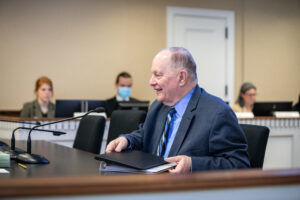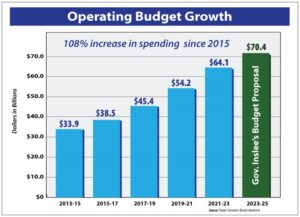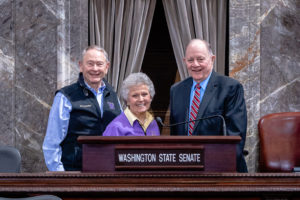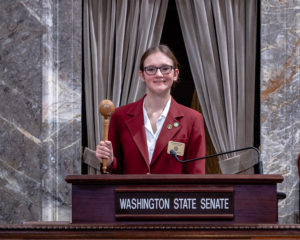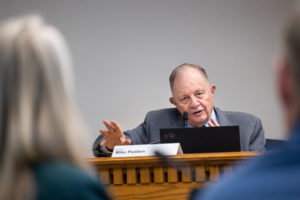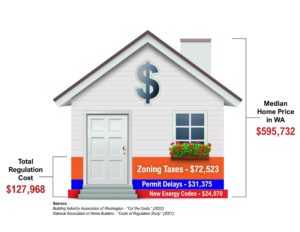Note: The following e-newsletter was sent to Sen. Padden’s subscribers April 6, 2023. To subscribe to Sen. Padden’s newsletter, click here.
Dear friends and neighbors,
Someone suffering from multiple sclerosis, ALS (Lou Gehrig’s disease) or some similar ailment often must rely on motorized wheelchairs or other high-tech equipment to have the mobility to continue living independent lives. Unfortunately, such equipment can cost $30,000 or more, making it hard to afford.
The Senate recently passed a bill I sponsored that would make it easier for people to purchase this expensive mobility-improving equipment.
The Senate last Friday voted 48-0 in favor of Senate Bill 5218, which would make the sale of motorized wheelchairs and other mobility-improving equipment tax-exempt. Removing the sales tax from motorized wheelchairs or other technological equipment will help those needing them to save money while also helping maintain their independence.
We received written testimony in favor of the bill from Steve Gleason, the former Gonzaga Prep, Washington State University and New Orleans Saints football player who contracted amyotrophic lateral sclerosis, known as Lou Gehrig’s disease.
Steve indicated how important this legislation would be, not only for those who have ALS or MS but those who need what I would call high-tech wheelchairs that can do so much and can cost $30,000 and up. The sales-tax portion is a large amount of money for this equipment. Steve pointed out that if people have this equipment, they are less likely to go into hospitals and require more expensive medical care.
The proposal states that to claim the sales-tax exemption, the purchaser must provide the seller with an exemption certificate as prescribed by the state Department of Revenue. The tax exemption would apply to mobility-enhancing equipment sold or used on or after Aug. 1, 2023.
SB 5218 has been sent to the House of Representatives for consideration.
You can hear a radio story created by Senate Republican Caucus broadcast information officer Tracy Ellis about the Senate passing this bill.
This newsletter covers several other issues and events happening in Olympia in this past week.
If you have questions about how to participate in state government this year or thoughts to share on anything in this e-newsletter, please give me a call or send me an email.
Thank you, as always, for the honor of serving as your state senator!
Happy Easter!
Best Regards,
Senator Mike Padden
Update on other Padden bills
After devoting much of our time the past three weeks to committee meetings in which public hearings were held on bills passed by the House, we are once again spending hours each day on the Senate floor to debate and vote on bills (mostly House proposals) that are still alive this session. The House is doing the same thing with bills passed earlier this session by the Senate.
Here is an update on my proposals that are still alive:
Senate Bill 5032, which would combat impaired driving, is no longer moving forward this session. But the bill’s language was amended last week onto another drunk-driving measure, House Bill 1493. SB 5032 would expand the period for reviewing prior convictions of impaired driving to 15 years, from the 10 years now in state law, when determining whether a new offense of impaired driving is charged as a felony. Under the proposal, any person who has three or more prior DUI offenses within that 15-year lookback period would face a felony, rather than the current penalty of a gross misdemeanor. Furthermore, SB 5032 would give offenders a chance to undergo a highly structured treatment program.
The Senate Transportation Committee passed HB 1493 on Tuesday, so now it is in the Senate Rules Committee, which acts as a final hurdle for bills to reach the Senate floor. Earlier this week, the Tacoma News Tribune published my guest editorial explaining why SB 5032 is important and how that language is now part of HB 1493.
Senate Bill 5058 would help encourage home ownership in our state by making it easier for smaller condominium buildings to be constructed. It specifically would exempt buildings with 12 or fewer units that are no more than two stories from the definition of multiunit residential building. SB 5058 is in the House Rules Committee, so it is close to reaching the floor for a full vote by the House.
Senate Bill 5096 would aid businesses looking to adopt an employee stock ownership plan (ESOP) corporate structure. The bill was passed Monday by the House Appropriations Committee, so it is expected to reach the House Rules Committee soon.
Next Wednesday, April 12, is the “floor cutoff” for the Senate to pass House bills. This year’s legislative session is scheduled to end Sunday, April 23.
Inslee uses tax money to buy over $1 million in abortion-causing pills
Governor Inslee’s plan to make Washington an “abortion destination state” took another disappointing step forward this week when he announced that the Department of Corrections, under his orders, purchased a three-supply (30,000 doses) of the abortion-causing drug mifepristone. DOC seems like the wrong agency for such, but it has a pharmacy license. Inslee also revealed that the University of Washington provided an additional 10,000 pills of this abortion-causing drug, bringing the state’s supply to 40,000 pills. Inslee said it cost the state $1,275,000 to buy the 30,000 pills.
I’m very disappointed that the governor has spent well over $1 million in public money (in other words, tax dollars) to buy such a large supply of abortion-causing drugs as part of his scheme to make Washington a destination state for women from other states to come here to receive an abortion. What about the unborn child?
And the thing is, he decided to make this expensive purchase all because a judge in Texas recently heard arguments in a court case that could force the federal Food and Drug Administration to rescind its approval of mifepristone. The Texas judge has not even issued a ruling, and yet Inslee has taken it upon himself to spend your tax dollars on a possible future event.
You can read KOMO-TV’s story about the abortion-pill mass purchase here.
During his news conference Tuesday announcing the pill purchase, Inslee shared that Democrats have introduced legislation – Senate Bill 5768 and House Bill 1854 – to authorize DOC to distribute or sell mifepristone to licensed health-care providers in our state. According to the KOMO story, medical abortions count for more than half of all abortions in the U.S. and nearly 60% of abortions in our state.
I am opposed to these proposals.
Senate passes its version of transportation budget
North-South Freeway construction.
On Wednesday, the Senate passed its own version of the 2023-25 state transportation budget. The vote was 42-6. The Senate Transportation Committee, on which I serve, had approved the Senate transportation budget (Senate Bill 5162) on Monday.
The Senate’s plan includes funding for these road or highway projects found in or near the 4th District:
- US 395 (North Spokane Freeway)
- I-90 corridor improvements in Spokane area
- I-90 corridor from Spokane to Idaho state line (design)
- I-90 interchange improvements from Barker to Harvard
- Barker Road/Trent Avenue grade separation
- Spokane Transit Authority – Interstate 90/Valley HPT corridor infrastructure
- Spokane Transit Authority – Argonne Station Park and Ride
- Spokane Transit Authority – Sprague Line High Performance Transit improvements
- Move Ahead Washington – Millwood Trail pedestrian and bike project
More information about the Senate transportation budget can be found here.
The House passed its transportation budget 96-1 on Monday. Now that the Senate has approved its version of the transportation budget, transportation-budget leaders from the two chambers will meet to negotiate a final version of the state transportation budget for the Senate and House to vote on near the end of our session.
Updated 4th District government guide now available
Every year or two, our office produces and mails a 4th District government guide to residents of our legislative district. With the help of my staff, we recently produced and sent out an updated government guide that includes helpful contact information on your local, state and federal government elected officials, as well as other government services. The online version of the new government guide can be found here.
If you did not receive the new government guide and would like a printed copy, please contact my legislative assistant, Irina, in our Olympia office by either calling at 360-786-7606 or emailing her at irina.dolbinina@leg.wa.gov.
Gonzaga Prep student serves as Senate page
It has been my pleasure to sponsor Gonzaga Prep freshman Jack Hamsher (above) as a Senate page this week. Jack is the son of Scott and Jennifer Hamsher of Spokane Valley. He is involved in several school activities, including Chess Club, Debate Club, Math Club and the Asian American and Pacific Islander affinity group. I thank all of the pages I sponsored this year for taking time away from their families, their schools and their friends to work in the Senate for a week. I hope they enjoyed their experience in Olympia, learned about how the Legislature works and made new friends.
Recent radio and TV interviews
During the past several days, I was asked to do various radio or TV interviews about different bills before the Legislature.
On Tuesday morning, I did a live interview with KXLY Radio’s Dave Spencer. We discussed the state operating-budget proposals, including funding for yet another study on the Snake River dams; my bill recently signed by the governor that increases penalties for jail guards who sexually assault those in their custody; and my bill making motorized wheelchairs and other mobility-enhancing equipment tax-exempt. You can hear the interview here.
Last Friday afternoon, I did a phone interview with KREM-TV’s Amanda Rowley for a story the station ran on House Bill 1240, which would ban semiautomatic firearms in our state. You can watch the story here.
Finally, last Thursday, I was interviewed for a story by KING-TV in Seattle about the governor signing Senate Bill 5033, which imposes harsher penalties for sexually abusive jail and prison guards. You can view that story here.
Contact us!
If you have a question or concern about state government, please do not hesitate to contact our office. During the session we are conducting business from our Senate office in Olympia. We are here to serve you!
Phone: (360) 786-7606
Olympia Office: 215 Legislative Modular Building, Olympia, WA 98504-0404
Email address: Mike.Padden@leg.wa.gov
PLEASE NOTE: Any email or documents you provide to this office may be subject to disclosure under RCW 42.56. If you would prefer to communicate by phone, please contact Sen. Padden’s Olympia office at (360) 786-7606.
To request public records from Sen. Padden, please contact Randi Stratton, the designated public records officer for the Secretary of the Senate and Senate members.



























